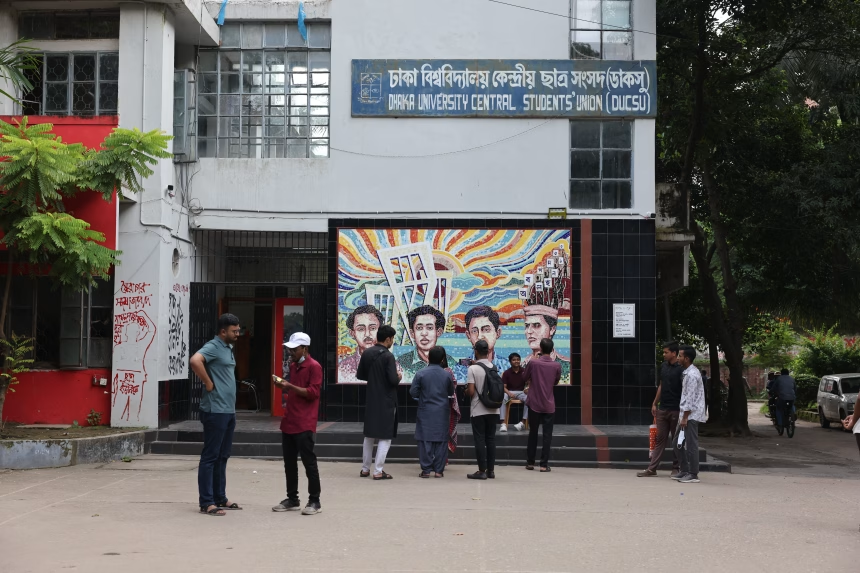The Dhaka University campus is in a festive mood ahead of the Ducsu polls. After six long years, this long-awaited election is set to be held on 9 September. This time, the number of candidates is at a record high, and the number of voters is almost 40,000.
Many students who once thought that Ducsu might remain a chapter in DU history are now excited again. But in the midst of all this excitement, a pressing question is slowly becoming apparent.
In such a large election, with so many voters and candidates, will everyone really get the chance to vote? To find an answer, no complicated research is needed. A simple analysis of publicly available data can shed more light on the issue.
Can everyone vote?
This time in the Ducsu polls, the number of voters is 39,775. For the 28 central posts, 471 candidates are competing. On top of that, in the 18 hall unions, there are 13 posts each, with another 1,035 candidates running.
To cover all bases, a single voter will have to cast 41 votes.
The polling day is set for 9 September, and voting will continue from 8am to 4pm, making it eight hours in total. Considering that voting usually starts slowly and there is pressure near the end, the effective time may be closer to seven hours.
Let us assume that finding the candidate’s name and putting a mark takes at least 10 seconds for each vote, then casting 41 votes would take around 410 seconds, which is almost seven minutes.
This means that in a single booth, at most eight people can vote in one hour, and in the whole day, no more than 55 to 60 voters can cast their votes.
Now, the number of booths is 710. So, theoretically, the maximum number of votes that can be cast in a day would be around 40,000. On paper, this seems okay. But doubts remain because the distribution of booths among centres is not equal.
In reality, some places have a large number of voters, but fewer booths.
For example, if we calculate for the voters of Ruqayyah Hall, the total number of voters here is 5,665. The polling centre for these students is set at TSC. According to the earlier calculation, each booth can take a maximum of 55 to 60 votes a day.
So, to allow all Ruqayyah Hall students to vote, there would need to be at least 95 to 105 booths. But due to space limitations, only 60 to 65 booths can be placed in TSC. This means that a maximum of 3,000 to 3,500 students can vote.
In other words, nearly 40 per cent of students from just one hall may not even get the chance to cast their vote.
Limited number of centres a headache
This is not only the concern of students but also of the candidates. The VP candidate from Chhatra Dal, Abidul Islam Khan, believes that the commission has not increased the number of centres on purpose.
In his words, “The number of centres has been kept limited to benefit a particular side.”
The VP candidate backed by the Islamist student group Shibir, Abu Sadik Kayem, said, “Our biggest worry is whether the voters will come to the centres spontaneously.
“Even if they come throughout the polling day, whether everyone will be able to vote within this timeframe remains a matter of concern.”
‘Sufficient preparations have been made’
On 3 September, the Chief Returning Officer of the Ducsu election, Professor Mohammad Jasim Uddin, held an urgent press conference at the Nawab Ali Senate Building of Dhaka University to address such issues.
He argued, “Voters usually prepare the name and ballot number of their preferred candidate beforehand, so it will not take much time to cast the vote. Eight minutes have been allotted for each voter.”
He also claimed that sufficient preparations have been made for the expected 40,000 voters.
Jasim Uddin assured, “Voting will continue uninterrupted from 8am to 4pm. If anyone arrives within this time at the polling centre premises, arrangements will be made for them to vote. The votes will be counted using scanning machines. These machines are highly efficient.
“Every effort will be made to deliver the results in the shortest possible time. Therefore, for now, we do not plan to increase the number of polling centres.”
So, according to the chief returning officer, voting will not take much time. But field experience shows that collecting the ballot, folding it, and putting it in the box – these extra steps together increase the actual voting time.
The history of Ducsu elections also shows that this kind of crisis is nothing new. In the election of 1989, chaos inside centres, long queues, and many complaints became the main topic of discussion.
Even the last election of 2019 was filled with controversies. On that day too, there were long lines outside centres, complaints, and many students reported that they could not cast their votes.


